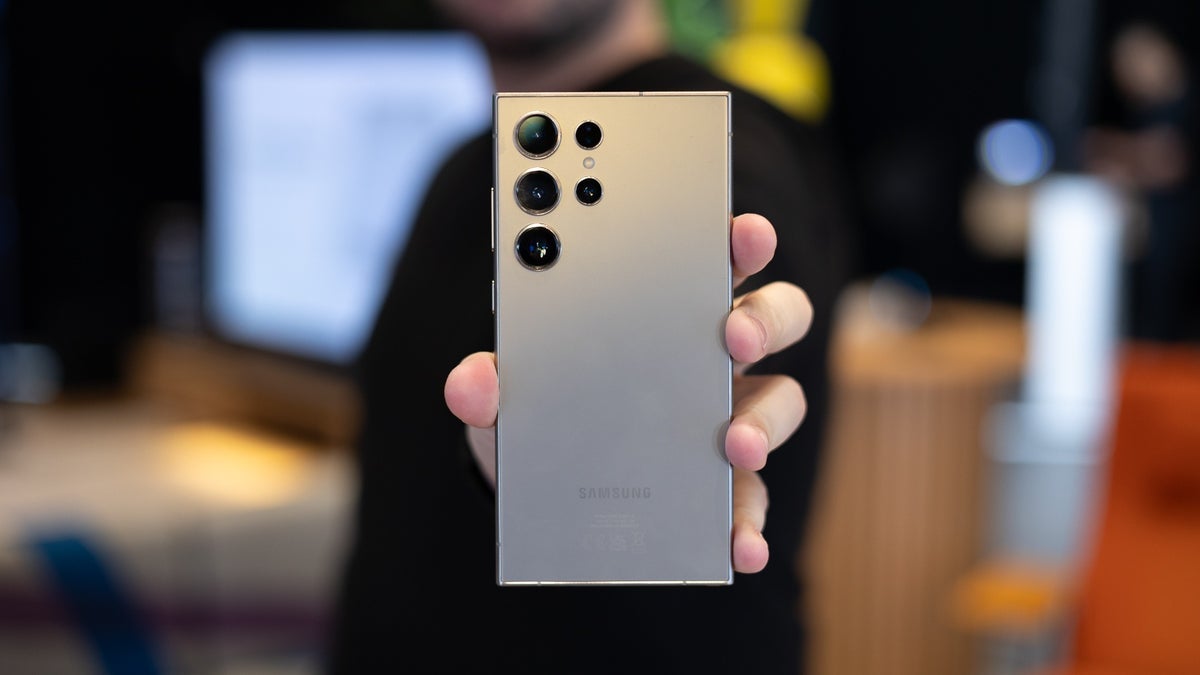Even if Galaxy AI fails to impress, Samsung is already working on expanding it
We may earn a commission if you make a purchase from the links on this page.

So far, the Galaxy S24 pre-orders are breaking sales records in South Korea and India.
The Galaxy S24 craze has certainly a lot to do with Samsung’s Galaxy AI – the promise of magic attracts people. Soon, people will have their Galaxy S24 hands-on and will see for themselves if the AI features are indeed as useful, funny, engaging and breathtaking as advertised.
Let’s say that in 2024 the AI tricks fail to impress smartphone users. With Google, Apple and most other brands going AI-centric in late 2023 and thus setting the course for 2024 and onwards, this is out of the question. Even if such an odd thing were to happen, the phone makers would not change course and ditch the AI implementation in their devices.
In any event, AI is great for marketing purposes.
It’s Samsung that went the extra AI mile. Instead of advertising a new flagship phone with some cool AI features (much like the Pixel 8 duo), the Korean giant focused on the Galaxy AI project and introduced the Galaxy S24 as the first to offer exclusive access to Samsung’s array of cool AI tricks and features. See, if you want to enter the VIP-MVP-GOAT-AI zone, the key to it is the Galaxy S24.
As we pointed out, If people suddenly decided that 2024 will be the year to dump whatever AI has to offer and head back to the “ordinary smartphone” realm, they’d have a hard time getting a non-AI device whatsoever, because every other phone maker is looking for ways to incorporate artificial intelligence features in some form in the handset.
Some are late to the party, as usual. You know who: Apple. Even Bloomberg’s Mark Gurman pointed out that Apple is “way behind” in the AI race and it’s precisely AI, not the iPhone as a standalone device, that will occupy the minds over at Cupertino in 2024.
Back to the Korean behemoth and its future take on AI.
For Samsung, the stakes are higher. In order not to look half-witted, they have to keep on delivering AI phones in the years to come. Introducing what’s basically a fresh take to the somewhat plateaued smartphone realm in 2024 and then ditching it in 2025 is a major no-no. The name of the game is commitment.
Congratulations on the newlyweds!
Apart from the fact that Samsung got itself locked with AI for the coming future and there’s no way back now, the Koreans are doubling down. They are preparing to showcase the world's fastest GDDR7 DRAM in February 2024 (via SamMobile). It’s to be utilized for AI-centric chips, gaming consoles, workstations, and other high-performance devices.
GDDR stands for Graphics Double Data Rate and the GDDR7 chips should offer insanely high bandwidth, making it a crucial component for upcoming high-performance AI semiconductors. Details are so far scarce, but Samsung is expected to talk about GDDR7 at the IEEE International Solid-State Circuit Conference in San Francisco next month.
It was previously revealed that Samsung's GDDR7 DRAM has a record-breaking bandwidth of 1.5TBps, a 40% increase over GDDR6. Also, the new chips are said to be 20% more power efficient compared to GDDR6 DRAM.
By now, someone could (understandably so) ask himself – “Okay, Samsung is making new RAM chips… So what?”
Well, these potentially hyper-fast GDDR7 chips will not only allow for the current tasks to be executed faster, but the new hardware will welcome the creation of a whole lot of futuristic AI apps, features, goodies, bells and whistles.
Speaking of the execution of AI-centric features, it’s important to remember they split into two different categories.
They can be:
For a given smartphone to be able to perform on-device AI tasks adequately (or at all), it needs top-notch hardware. Some tasks, though, are so demanding that the device sends the image/video/text to the company servers, where the magic is being done. Of course, an internet connection is required in that case. Another “of course”: sending stuff to some servers for editing will give some people – mainly those that are obsessed with privacy – nightmares.
Faster memory chips from Samsung will mean not only that the AI tasks will be executed faster on-device, but the company servers that are responsible for cloud computing will also get better and faster. It’s a win-win situation for both ends!
We’re at the dawn of the “AI for the masses” phenomenon – up until five minutes ago, the two-letter abbreviation was strictly limited to high-tech science operators and Steven Spielberg (now’s a good time to rewatch his 2001 classic ‘A.I. Artificial Intelligence’ starring Jude Law and Haley Joel Osment).
Now, AI can be in your pocket. It’s up to the phone makers to make the artificial intelligence features unique and distinct.
The Galaxy S24 craze has certainly a lot to do with Samsung’s Galaxy AI – the promise of magic attracts people. Soon, people will have their Galaxy S24 hands-on and will see for themselves if the AI features are indeed as useful, funny, engaging and breathtaking as advertised.
Samsung’s future take on AI
It’s Samsung that went the extra AI mile. Instead of advertising a new flagship phone with some cool AI features (much like the Pixel 8 duo), the Korean giant focused on the Galaxy AI project and introduced the Galaxy S24 as the first to offer exclusive access to Samsung’s array of cool AI tricks and features. See, if you want to enter the VIP-MVP-GOAT-AI zone, the key to it is the Galaxy S24.
As we pointed out, If people suddenly decided that 2024 will be the year to dump whatever AI has to offer and head back to the “ordinary smartphone” realm, they’d have a hard time getting a non-AI device whatsoever, because every other phone maker is looking for ways to incorporate artificial intelligence features in some form in the handset.
Back to the Korean behemoth and its future take on AI.
For Samsung, the stakes are higher. In order not to look half-witted, they have to keep on delivering AI phones in the years to come. Introducing what’s basically a fresh take to the somewhat plateaued smartphone realm in 2024 and then ditching it in 2025 is a major no-no. The name of the game is commitment.
Congratulations on the newlyweds!
Better, smarter, faster AI with the world’s fastest memory chips
Apart from the fact that Samsung got itself locked with AI for the coming future and there’s no way back now, the Koreans are doubling down. They are preparing to showcase the world's fastest GDDR7 DRAM in February 2024 (via SamMobile). It’s to be utilized for AI-centric chips, gaming consoles, workstations, and other high-performance devices.
Samsung had confirmed in July last year that it would soon begin manufacturing the new DRAM chips. Of course, this will translate into faster memory chips for smartphones thus allowing for more AI goodies to be packed in future Galaxy S devices.
GDDR stands for Graphics Double Data Rate and the GDDR7 chips should offer insanely high bandwidth, making it a crucial component for upcoming high-performance AI semiconductors. Details are so far scarce, but Samsung is expected to talk about GDDR7 at the IEEE International Solid-State Circuit Conference in San Francisco next month.
It was previously revealed that Samsung's GDDR7 DRAM has a record-breaking bandwidth of 1.5TBps, a 40% increase over GDDR6. Also, the new chips are said to be 20% more power efficient compared to GDDR6 DRAM.
Is that important?
By now, someone could (understandably so) ask himself – “Okay, Samsung is making new RAM chips… So what?”
Speaking of the execution of AI-centric features, it’s important to remember they split into two different categories.
They can be:
- On-device
- Cloud computing
For a given smartphone to be able to perform on-device AI tasks adequately (or at all), it needs top-notch hardware. Some tasks, though, are so demanding that the device sends the image/video/text to the company servers, where the magic is being done. Of course, an internet connection is required in that case. Another “of course”: sending stuff to some servers for editing will give some people – mainly those that are obsessed with privacy – nightmares.
New hardware, new features
We’re at the dawn of the “AI for the masses” phenomenon – up until five minutes ago, the two-letter abbreviation was strictly limited to high-tech science operators and Steven Spielberg (now’s a good time to rewatch his 2001 classic ‘A.I. Artificial Intelligence’ starring Jude Law and Haley Joel Osment).
Now, AI can be in your pocket. It’s up to the phone makers to make the artificial intelligence features unique and distinct.
In this line of thought, it’s mandatory for Samsung to come up with some AI goodies of its own. For the Galaxy S24, the Korean giant relied heavily on Google’s AI tricks. The Samsung/Google partnership is great, but rivalry is also important.
Gee, I really wonder what a phone would look like – not on the outside, of course – in five to ten years.
Gee, I really wonder what a phone would look like – not on the outside, of course – in five to ten years.
Follow us on Google News












Things that are NOT allowed:
To help keep our community safe and free from spam, we apply temporary limits to newly created accounts: